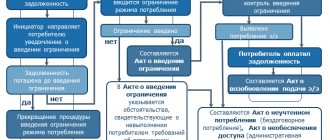Many people (especially unscrupulous utility payers) are interested in what is the procedure for shutting off electricity in compliance with the law in 2021. Can they leave without electricity without warning in advance? What are the grounds for turning off electricity if minor children live in the house? To answer all these questions, it is necessary to refer to the law governing the relationship between the apartment owner and service providers, which in our case will be housing and communal services, a management company, a housing association, energy sales, etc.
The main legislative act in this situation is, of course, Resolution No. 354, which was adopted by the Government of the Russian Federation in 2011 with amendments made to it. Also, the rules for the provision of utility services are prescribed in Resolution No. 307. But still, the main law that you need to focus on is Resolution No. 442. It does not develop rules in general terms for all utilities, but specifically for electricity supply. Currently, the total debt to housing and communal services employees is approximately 900 billion.
Almost a third of this amount is owed by ordinary citizens, the rest is on the conscience of legal entities and organizations. Accordingly, various methods of punishment are applied to defaulters in order to achieve fulfillment of their obligations. The law allows employees of organizations providing electricity supply to apartments to turn off the lights if there are late payments. But here the procedure for turning off the power must be followed, otherwise the law will define this action as a violation. And this is already a reason for you to complain where you should and demand compensation for moral damage.
For all questions related to solving public service problems, you can consult for free on our website with experienced lawyers using the feedback form.
Law on power outages for non-payment in 2021
In the housing and communal services sector, there are a number of regulations according to which utility services must be provided to the population uninterruptedly and with high quality. In turn, homeowners – consumers of services – are obliged to pay for them in a timely manner and in full.
Supply organizations cannot refuse to supply resources necessary for the lives of citizens (water, gas, electricity) without compelling reasons. But the legislator has determined cases when they have the right to limit or stop their supply.
The service provider is a party to the electricity supply contract.
The supplier of electricity to apartment buildings and private buildings is the energy supply organization with which an agreement has been concluded for the supply of the resource.
Most often, contracts for apartment buildings are concluded by management companies, and for private houses - directly by consumers.
How to deal with frequent power outages online via the Internet?
- As a rule, the websites of municipal administrations are interactive, where you can write a statement outlining your problems and wait for a response.
- Register on the federal government services website and file a complaint in the appropriate window on this site. Registration rules are given on the website. They require a personal appearance at one of the local institutions for identification.
- If the previous appeal did not have any effect, you should contact the website of the regional prosecutor's office with a complaint in any form.
Finding out the address is easy: write in Yandex Search: website of the prosecutor's office of the N region (republic, territory, district). Your complaint will be considered if it does not violate the rules given on this site. If you have not previously contacted the authority to which the energy supply organization is subordinate, your application will be forwarded to this authority for action.
Reasons for turning off the lights for non-payment of utilities
Unauthorized shutdown of electricity by the service provider is an illegal act. The legislation strictly defines cases and grounds for stopping the supply of light, which can be grouped as follows:
The occurrence of cases beyond the control of the consumer. This may include:
- planned preventive measures carried out on networks;
- accident elimination;
- breaks in power supply lines due to natural disasters, emergencies, etc.
Occurrence of cases depending on the consumer:
- refusal to pay for the consumed resource and the occurrence of debt;
- improper use of devices, which can lead to emergency situations;
- unauthorized connection;
- connecting electrical appliances exceeding the maximum permissible power;
- any violation of the contract.
Most often, a shutdown or suspension of electricity supply to an apartment or house occurs due to accumulated debt. At the same time, the service provider has the right to turn off the lights if there is a debt for consumed electricity, if the payment has not been paid for more than two months (clause 118 of PP No. 354) .
This norm is enshrined in legislation and cannot be changed by the contractor independently.
— Can electricity be turned off for non-payment without a court decision?
Yes they can! To turn off electricity, you do not need a court decision, but only need to notify the defaulter on time and follow the procedure for turning off the lights.
What to do in case of technical problems
At the suggestion of one respected satirist, it became very funny to look out the window when the electricity goes out. In fact, this is a completely correct action. If the entire neighborhood is de-energized, you can turn on an emergency light source (candle, lantern) and wait for the fault to be eliminated.
But if you find that only your entrance or a group of houses connected to one phase is not working, you need to contact the dispatch service. The fact is that only line breaks with voltages of 10 kV and above are recorded at the control center of regional electrical networks.
Consumers report incidents on 0.4 kV lines, which are all household electrical networks. Do this immediately when there is smoke coming from the switchboard, power substation, or the transformer is humming unusually loudly!
After all, repairing completely burnt-out power equipment will take much more time than replacing its faulty part. The emergency telephone number to call if an emergency occurs is usually indicated on the doors of the substation or switchboard.
Procedure for turning off electricity for non-payment of utilities
Art. 119 in Resolution No. 354 provides for a strict procedure for cutting off electricity in case of non-payment within 20 days. Therefore, the performer must adhere to the procedure in order for the actions to be recognized as legal. At the slightest non-compliance, the consumer has the right to file a complaint against the actions of the contractor to the supervisory authorities or court. If the actions are found illegal, the performer will be required to pay a fine.
How to write a complaint against the Criminal Code?
Sample complaint against Energosbyt to the prosecutor's office for illegal blackouts
Before disconnecting, a notification must be sent to the defaulter by any of the following methods:
- delivery in person against signature;
- by registered letter with notification, and the fact of receipt will be reflected in the notification.
The debtor is then given 20 days, during which the debtor is obliged to repay the debt.
If payments are not received, at the end of the established period, a restriction on electricity consumption is introduced for 10 days. Then it is turned off.
If limited supply of light is not possible, electricity will be turned off after 30 days of non-payment. In this case, harm to everyone living in the house must be excluded, and damage to common property must also be prohibited.
At the moment of termination or limitation of the supply of a resource, an official document is drawn up - a power outage act, which indicates:
- date of actions taken;
- consumer data;
- address of the housing being disconnected;
- how the shutdown was made;
- meter readings indicating its number;
- grounds for stopping or limiting the supply of electricity;
- shutdown period.
An act is drawn up in three copies and after signing, one of them is handed over to the consumer.
Liability for unjustified termination of power supply to individual apartments
Administrative
Administrative liability may arise in situations where the shutdown was carried out without following a legal procedure (what is the procedure for turning off electricity?).
- You can refer to Article 19.1 of the Code of Administrative Violations. The actions of the electricity supplier will be regarded as arbitrariness, and the punishment will be a fine in the amount of 100 to 300 rubles, and for officials from 300 to 500 rubles.
- If the lights are turned off very often, then you can resort to Article 7.23 of the Code of Administrative Offenses. For officials, the amount of the fine will be from 500 to 1,000 rubles, and for legal entities from 5,000 to 10,000 rubles. But only if it turns out that there is a real violation of the standards for providing the population with electrical energy.
- If the energy company is a monopolist in the energy market, then in this case Article 14.31 of the Code of Administrative Offenses can be applied. It indicates abuse of its dominant position in the market. Punishment for officials in the amount of 15,000 to 20,000 rubles, and for legal entities from 300,000 to 1 million rubles.
Criminal
- Very often, illegal power cuts can be calculated in accordance with Article 330 of the Criminal Code as arbitrariness. This means that the person who is responsible for the failure of power supply must be subject to a fine or correctional labor. Arrest and imprisonment are permitted.
- Also, in accordance with paragraph 1 of Article No. 215.1 of the Criminal Code of the Russian Federation, if a power outage resulted in any damage, for example, harm to health and so on, then in this case a fine, correctional labor, or even imprisonment will be imposed.
- If a power outage caused the death of a person, the official will be held accountable to the law in accordance with paragraph 2 of Article 215.1 of the Criminal Code. The punishment will be forced labor and a ban on holding certain positions.
Where to go to connect electricity
You can apply for restoration of power supply only after the debt has been fully repaid. Alternatively, it is possible to reach an agreement with the contractor to provide payment in installments. Connecting the light is a service that you will have to pay for.
To connect the light back you need:
- Contact the service organization (for example, OEC), you can find it in the receipt.
- Pay for the service of restoring electricity, costing about 600-800 rubles.
- Within 2 days, an electrician must come and remove the seal (ab. 9, clause 120 of PP No. 354).
The law is harsh
As of January 1, 2021, the moratorium on power outages and the accrual of penalties for late payments ceased to apply. Let us remember that the relaxations introduced a year earlier were related to the pandemic. This does not mean that all debts were forgiven in 2021, but defaulters did not risk being left without electricity.
Now the conditions return to the original ones, which means that:
- Penalties will be charged for late payment.
- If payments are delayed for a long time, electricity supply may be suspended or terminated.
- In order for the light to return, you will have to pay a certain amount, and this will not happen immediately, but only within two days.
What other penalties are there for non-payment?
Shutting off electricity is one of the measures to combat non-payers for utility services. Other measures may also apply to them:
- Peni . For non-payment of any of the housing and communal services, the contractor has the right to charge penalties. It is accrued after 90 days, during which debts accumulated. This means that from the 91st day an amount of 1/130 of the refinancing rate established by the Central Bank of the Russian Federation will be accrued daily. You can check the calculation of charges in a convenient online calculator.
- Eviction . Applies only to those residents who occupy municipal housing space on the basis of a social tenancy agreement and have not paid utility bills for more than six months. At the same time, if at least part of the payments are made or there are valid reasons, eviction is not applied. This measure can only be used on the basis of a court decision.
The owners of the premises can only be evicted by a court decision.
In general, it is impossible to disconnect a consumer from electricity for non-payment of other utility bills. The debt is calculated for each specific service and the measure of restriction or disconnection is applicable only for it. This means that if there is a water debt, only the water can be turned off.
If the consumer currently has a difficult financial situation that does not allow him to pay for electricity in full, he must contact the management company or the resource supplier (depending on who the contract for the supply of energy is concluded with) for an installment payment plan. Typically, such installments are provided for a period of six months. This will avoid a power outage in the apartment.
When is debt not a basis for non-provision of services?
The laws do not contain specific categories of people who are prohibited from turning off electricity, but if such a procedure makes the living space unsuitable for living, then this will be a direct violation of the law, “c” in paragraph 122 of Government Resolution 354.
There are several categories of citizens who are given concessions when power outage based on outstanding debt . Thus, it is impossible to disconnect in cases where the following people live in the residential premises:
- pregnant women;
- disabled people;
- minors;
- WWII veterans.
To confirm the preferential category, you must provide the appropriate certificate to the energy supply organization. It should be borne in mind that in this case the beneficiary must have permanent registration in this residential premises.
Our experts have prepared several more useful articles:
- The electricity in the apartment was turned off for non-payment: what should I do, how can I reconnect the electricity?
- Rules and procedure for turning off electricity in SNT for non-payment.









